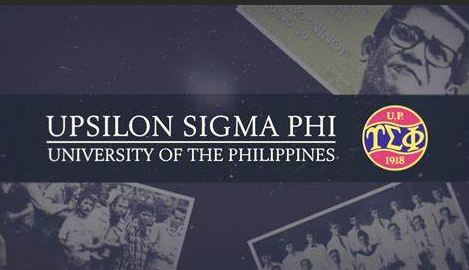Opinion
The Upsilon Sigma Phi: A Legacy of Brotherhood and Service by Edwin Paña '69

Introduction
The Upsilon Sigma Phi is the oldest Greek-letter fraternity in Asia, founded at the University of the Philippines in 1918. Known for its commitment to excellence, brotherhood, and service, USP has a storied history that continues to influence its members and the communities they serve.
Historical Background
Founding and Early Years
The Upsilon Sigma Phi was established on November 19, 1918, by twelve university students. Their aim was to form a fraternity that upheld the values of leadership, loyalty, and integrity. The fraternity's motto, "We Gather Light to Scatter," embodies its mission to cultivate enlightened individuals who contribute positively to society.
Expansion and Growth
In its early years, the Upsilon Sigma Phi quickly grew in membership, attracting individuals who were not only academically excellent but also active in campus leadership and national affairs. The fraternity expanded its influence beyond the University of the Philippines, establishing chapters in other institutions and fostering a network of accomplished professionals across various fields.
Core Values and Principles
Brotherhood
The bond of brotherhood is the cornerstone of the Upsilon Sigma Phi. Members form lifelong relationships based on mutual respect, support, and shared ideals. This strong sense of camaraderie is evident in the fraternity’s numerous social, academic, and community activities, fostering a supportive environment for personal and professional growth.
Leadership
Leadership development is a key focus of the Upsilon Sigma Phi. The fraternity has a long history of producing leaders in government, business, academia, and other sectors. Members are encouraged to take on leadership roles both within the fraternity and in broader societal contexts, embodying the principle of servant leadership.
Service
Service to the community is a fundamental aspect of the Upsilon Sigma Phi's mission. The fraternity is involved in various outreach programs, charitable activities, and social initiatives. These efforts are aimed at addressing societal issues, promoting education, and enhancing the well-being of communities.
Some Notable Members
Over the years, the Upsilon Sigma Phi has been home to many distinguished individuals who have made significant contributions in various fields. Some notable members of the Upsilon Sigma Phi include:
• Jose P. Laurel (Honorary) - 4th President of the Philippines
• Ferdinand E. Marcos, Sr. - 10th President of the Philippines
• Salvador H. Laurel - Senator and Vice President of the Philippines
• Distinguished members of the House of Representatives and the Senate, Supreme Court Justices, local government officials and members of the cabinet
• Distinguished members of the academe and the scientific community
Tradition and Key Activities
Initiation in the Fraternity
The initiation process is a significant event in the life of an Upsilonian. It is designed to instill the fraternity’s core values and principles in new members, fostering a sense of belonging and commitment to the fraternity’s ideals.
Annual Celebrations
The fraternity holds several annual celebrations, including its foundation anniversary and alumni homecoming. These events provide opportunities for members to reconnect, celebrate their shared heritage, and plan for future activities.
Community Service Projects
Community service projects are a hallmark of the fraternity's activities. From educational programs and scholarships to medical missions and environmental initiatives, the fraternity is dedicated to making a positive impact on society.
Contributions and Impact
Campus Leadership
Members of the Upsilon Sigma Phi have historically held key leadership positions within the U.P. community, influencing policies and advocating for students' rights.
National Influence
Beyond the university, Upsilonians have played pivotal roles in shaping the political and social landscapes of the Philippines. Their involvement in constitutional conventions and government positions underscores their commitment to public service.
Challenges and Adaptations
Navigating the Modern Era
Like many longstanding institutions, the Upsilon Sigma Phi has faced challenges in adapting to changing societal norms and expectations. The fraternity has made efforts to modernize its practices, ensuring that it remains relevant and inclusive while staying true to its core values.
Commitment to Excellence
Despite the challenges, the fraternity's commitment to excellence remains unwavering. The fraternity continues to attract high-caliber individuals who are dedicated to making a difference in their communities and beyond.
Conclusion
The Upsilon Sigma Phi’s legacy of brotherhood, leadership, and service has left an indelible mark on its members and the broader society. As the fraternity looks to the future, it remains committed to upholding its founding principles and continuing its tradition of excellence. Through its enduring values and dynamic activities, Upsilon Sigma Phi will undoubtedly continue to gather light to scatter, shaping the leaders and changemakers of tomorrow.
About the Author

Edwin Paña '69
Edwin O. Paña '69 is a multifaceted professional with a diverse academic foundation in Forestry and Business Administration. As a retired entrepreneur, he has successfully led multiple ventures throughout his career. In 2024, he was honored with the prestigious Tanglaw Award for Leadership, a testament to his dedicated service as Board Chairman of Upsilon Sigma Phi North America, Inc., where he contributed over a decade of impactful leadership.


